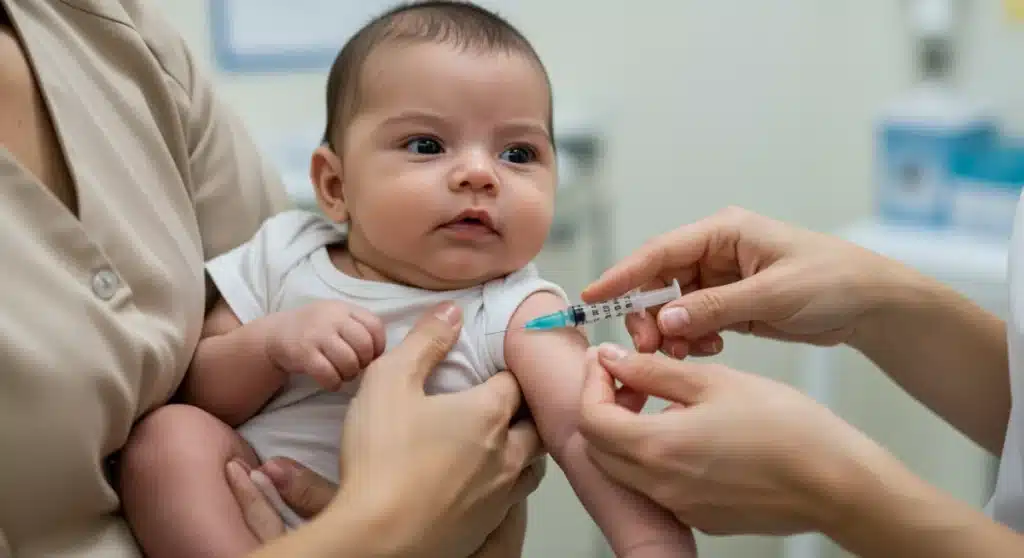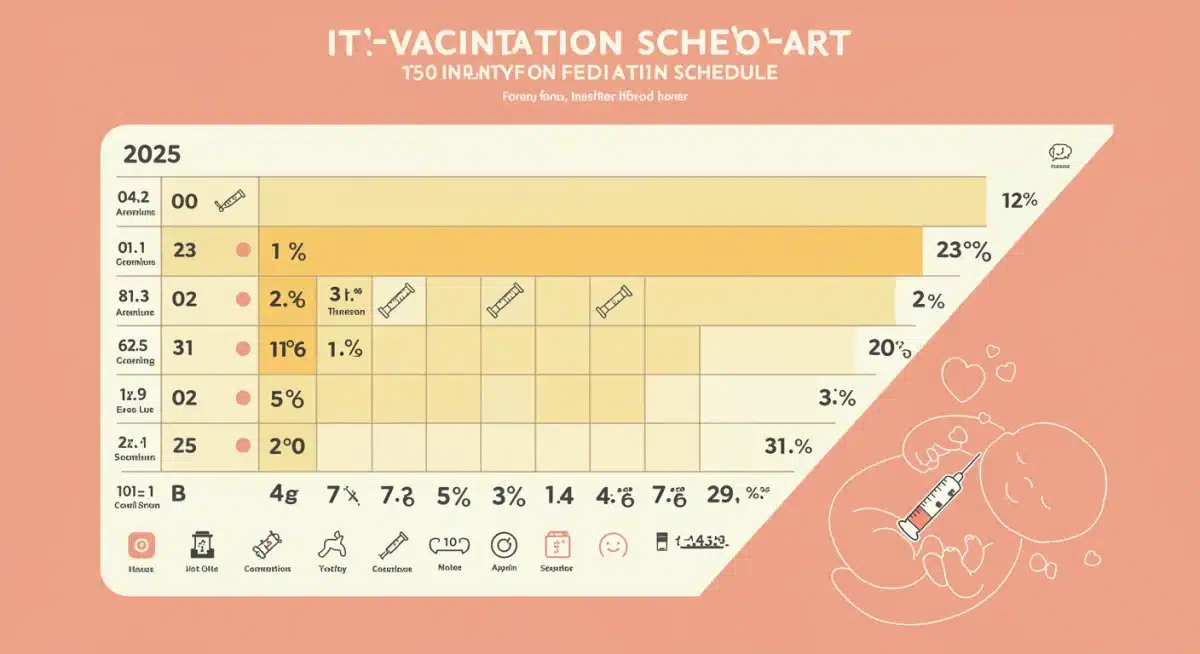Vaccination Schedule 2025: Protecting Your Baby Effectively

Advertisement
Understanding the 2025 baby vaccination schedule is paramount for safeguarding your infant against a range of serious, preventable diseases, ensuring their robust health and well-being from infancy into childhood.
As new parents, navigating the myriad of decisions concerning your baby’s health can feel overwhelming. Among the most critical choices you’ll make is adhering to the recommended immunization guidelines. The baby vaccination schedule for 2025 is a cornerstone of pediatric care, designed to build your child’s immunity against a host of dangerous, yet preventable, diseases. This comprehensive guide aims to demystify the schedule, highlight the importance of each vaccine, and empower you with the knowledge to make informed decisions for your little one’s future.
Advertisement
Understanding the 2025 Baby Vaccination Schedule
The 2025 baby vaccination schedule is developed by leading medical experts, including the Centers for Disease Control and Prevention (CDC) and the American Academy of Pediatrics (AAP), to provide optimal protection during critical developmental stages. This schedule is not arbitrary; it’s meticulously planned to introduce vaccines when a baby’s immune system is ready to respond effectively and when they are most vulnerable to specific diseases.
Vaccines work by introducing a weakened or inactivated form of a virus or bacteria, or parts of it, to your baby’s immune system. This exposure teaches the body to recognize and fight off the actual disease without causing illness. The schedule ensures that children receive these crucial protections at the right time, maximizing their effectiveness and minimizing risks.
Why follow the recommended schedule?
Adhering to the recommended vaccination schedule is vital for several reasons. It ensures your baby develops immunity before being exposed to potentially life-threatening diseases. Delaying or skipping vaccinations can leave your child vulnerable during their most susceptible years.
Advertisement
- Early Protection: Infants are highly susceptible to infections, and early vaccination provides protection when they need it most.
- Community Immunity: High vaccination rates protect not only your child but also those who cannot be vaccinated, like newborns, the elderly, and individuals with compromised immune systems.
- Disease Eradication: Vaccinations have led to the eradication or near-eradication of diseases like smallpox and polio, demonstrating their profound impact on public health.
Understanding the science behind the schedule can alleviate many common concerns. Each vaccine undergone rigorous testing and approval processes to ensure its safety and efficacy. Pediatricians are excellent resources for discussing any questions or apprehensions you may have regarding the specific vaccines on the 2025 schedule.
Key Vaccines in the 2025 Schedule and Their Importance
The 2025 baby vaccination schedule includes a series of vaccines targeting a wide array of infectious diseases. Each vaccine plays a critical role in safeguarding your child’s health and preventing severe illness. Knowing what each vaccine protects against can help parents appreciate their significance.
From the moment of birth, babies are recommended to receive their first dose of the Hepatitis B vaccine. This early protection is crucial because Hepatitis B can be transmitted from mother to baby during childbirth and can lead to serious liver damage later in life. Subsequent doses build on this initial immunity, providing long-term protection.
Essential immunizations for infants
As your baby grows, the schedule introduces more vaccines designed to protect against common childhood diseases. These include diphtheria, tetanus, pertussis (DTaP), polio (IPV), Haemophilus influenzae type b (Hib), pneumococcal disease (PCV), and rotavirus (RV).
- DTaP: Protects against diphtheria, a serious bacterial infection; tetanus, a severe nervous system disease; and pertussis (whooping cough), a highly contagious respiratory illness particularly dangerous for infants.
- IPV: Shields against poliovirus, which can cause paralysis and even death.
- Hib: Prevents Haemophilus influenzae type b, a leading cause of bacterial meningitis, pneumonia, and epiglottitis in young children.
- PCV: Guards against pneumococcal disease, which can lead to ear infections, pneumonia, and severe infections like meningitis.
- RV: Protects against rotavirus, a common cause of severe diarrhea and dehydration in infants and young children.
These vaccines are administered in a series of doses over several months to ensure comprehensive and lasting immunity. Each dose builds upon the previous one, strengthening the immune response and providing robust protection. Your pediatrician will provide a personalized schedule based on your baby’s birth date and health status.
Addressing Common Concerns About Baby Vaccinations
It’s natural for parents to have questions and concerns about vaccinations. The sheer volume of information available, both accurate and inaccurate, can be overwhelming. Understanding the facts about vaccine safety and efficacy is crucial for making informed decisions for your baby’s health.
One of the most frequent concerns revolves around vaccine safety. Decades of research and millions of vaccinated children have consistently demonstrated that vaccines are incredibly safe. Serious side effects are rare and typically mild, such as low-grade fever or soreness at the injection site. The benefits of vaccination far outweigh the minimal risks.
Separating fact from fiction
Misinformation about vaccines can spread quickly, often causing unnecessary fear. It’s important to rely on credible sources for information, such as your pediatrician, the CDC, and the AAP. These organizations base their recommendations on extensive scientific evidence and public health expertise.
- Vaccines and Autism: Extensive scientific studies have definitively shown no link between vaccines and autism. This claim originated from a fraudulent and retracted study.
- Overwhelming the Immune System: Babies are exposed to countless antigens daily. Vaccines introduce a very small number of antigens compared to what a baby’s immune system naturally handles, making them safe and effective.
- Natural Immunity vs. Vaccine Immunity: While natural infection can provide immunity, it comes with the risk of severe illness, complications, or death. Vaccines offer protection without the dangers of the disease itself.
Open communication with your pediatrician is key to addressing any anxieties. They can provide personalized advice, discuss potential side effects, and explain how vaccines work to protect your child. Trusting your healthcare provider and evidence-based medicine is the best approach to ensuring your baby’s well-being.
Preparing for Your Baby’s Vaccination Appointments
Vaccination appointments can sometimes be stressful for both babies and parents. However, with a little preparation, you can make the experience smoother and more comfortable for everyone involved. Being prepared helps alleviate anxiety and ensures your baby receives the necessary care efficiently.
Before the appointment, make sure you have a list of any questions or concerns you want to discuss with your pediatrician. This ensures you don’t forget important points during the visit. Also, bring your baby’s immunization record, if you have one, to ensure all vaccinations are properly documented.
Tips for a smoother vaccination experience
During and after the appointment, there are several strategies you can employ to comfort your baby and manage any mild side effects. These simple steps can make a significant difference in your baby’s comfort level.
- Comfort during the shot: Hold your baby close, offer a pacifier, or distract them with a toy. Some parents find skin-to-skin contact comforting.
- Pain relief: Discuss with your pediatrician whether pain relievers like infant acetaminophen are appropriate before or after the shots.
- Post-vaccination care: Your baby might be fussy, have a low-grade fever, or experience soreness at the injection site. Applying a cool, damp cloth to the area can help. Offer extra cuddles and fluids.

Remember that these minor reactions are a sign that your baby’s immune system is building protection. If you notice any severe or unusual reactions, contact your pediatrician immediately. Most reactions are mild and resolve quickly, allowing your baby to return to their cheerful self.
The Role of Vaccinations in Public Health and Community Immunity
Vaccinations do more than just protect individual children; they play a monumental role in public health by fostering community immunity, also known as herd immunity. When a significant portion of the population is vaccinated against a disease, it becomes much harder for that disease to spread, protecting even those who cannot be vaccinated.
This concept is particularly vital for infants too young to receive certain vaccines, individuals with compromised immune systems due to medical conditions or treatments, and those with severe allergies to vaccine components. These vulnerable groups rely on the immunity of the wider community for their protection. High vaccination rates create a protective shield, significantly reducing the circulation of infectious diseases.
Protecting the most vulnerable
The collective effort of vaccination has profound implications for society. It means fewer outbreaks, less strain on healthcare systems, and a healthier overall population. When vaccination rates drop, even slightly, we often see a resurgence of diseases that were once nearly eliminated.
- Stopping Disease Spread: When most people are vaccinated, the chain of infection is broken, preventing the disease from reaching susceptible individuals.
- Protecting Future Generations: Sustained high vaccination rates can lead to the eradication of diseases, ensuring that future generations do not have to face the same threats.
- Economic Benefits: Preventing illness reduces healthcare costs, lost productivity for parents, and the economic burden of managing outbreaks.
The decision to vaccinate your child is not just a personal one; it’s a contribution to the health and safety of your entire community. By participating in the recommended vaccination schedule, you become a part of a larger public health initiative that safeguards countless lives and promotes a healthier society for everyone.
Future Trends and Updates in Baby Vaccinations for 2025 and Beyond
The field of vaccinology is constantly evolving, with ongoing research and development leading to new and improved vaccines. For 2025 and the years to come, parents can anticipate continued advancements aimed at further enhancing the safety, efficacy, and breadth of protection offered by immunizations. Staying informed about these developments is part of ensuring your child receives the best possible care.
One area of continuous focus is the development of combination vaccines, which reduce the number of injections a child needs while still providing protection against multiple diseases. This not only makes the vaccination process less stressful for children and parents but also helps improve adherence to the recommended schedule.
Innovations in vaccine development
Researchers are also exploring novel vaccine technologies, such as mRNA vaccines, which have shown tremendous promise in recent years. These technologies could lead to faster vaccine development in response to emerging threats and potentially offer even more robust immune responses.
- Broader Protection: New vaccines are being developed to target diseases for which there is currently no vaccine, or to improve existing ones.
- Personalized Schedules: Advancements in genetic research may one day allow for more personalized vaccination schedules tailored to an individual’s genetic makeup and risk factors.
- Global Health Initiatives: Efforts continue to ensure equitable access to vaccines worldwide, aiming to eliminate preventable diseases on a global scale.

Staying connected with your pediatrician and reputable health organizations like the CDC will ensure you receive the most up-to-date information on any changes or additions to the baby vaccination schedule. These ongoing advancements underscore the dynamic and critical role vaccines play in pediatric health.
| Key Aspect | Brief Description |
|---|---|
| Schedule Importance | Ensures optimal protection against preventable diseases at critical developmental stages. |
| Key Vaccines | Includes DTaP, IPV, Hib, PCV, RV, and Hepatitis B, protecting against severe infections. |
| Safety & Efficacy | Vaccines are rigorously tested and proven safe, with benefits far outweighing minimal risks. |
| Community Immunity | High vaccination rates protect vulnerable individuals by limiting disease spread. |
Frequently Asked Questions About Baby Vaccinations
The primary goal is to provide infants with timely and effective protection against a range of serious, preventable infectious diseases. It ensures their developing immune systems are prepared to fight off pathogens, minimizing risks of severe illness and complications during crucial early years.
Yes, vaccines are rigorously tested for safety and efficacy before approval. While babies receive multiple doses, their immune systems are naturally equipped to handle many more antigens than those introduced by vaccines, making the schedule safe and effective without overwhelming their natural defenses.
If your baby misses a scheduled vaccine, contact your pediatrician immediately. They can help you catch up on the missed doses. It’s generally not necessary to restart a vaccine series; your doctor will adjust the schedule to ensure your child receives full protection as soon as possible.
No, extensive scientific research and numerous studies have consistently and definitively shown no link between vaccines and autism or other developmental disorders. This claim has been thoroughly debunked by the medical and scientific community, emphasizing vaccine safety.
When a high percentage of the population is vaccinated, it creates ‘herd immunity,’ making it difficult for infectious diseases to spread. This protects not only vaccinated individuals but also those who cannot be vaccinated due to age, medical conditions, or allergies, safeguarding the entire community.
Conclusion
The 2025 baby vaccination schedule stands as a testament to modern medicine’s commitment to protecting the most vulnerable among us. By adhering to these carefully crafted guidelines, parents provide their children with a robust defense against diseases that once caused widespread suffering and mortality. It’s a decision rooted in science, supported by decades of research, and driven by a collective desire for healthier communities. Engaging with your pediatrician, staying informed, and prioritizing timely immunizations are the most powerful steps you can take to ensure your baby’s bright and healthy future, free from the burdens of preventable illnesses.





